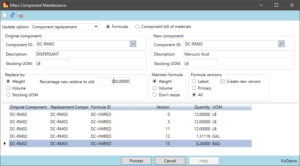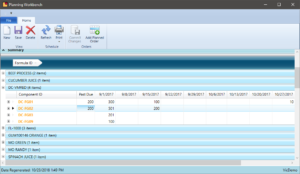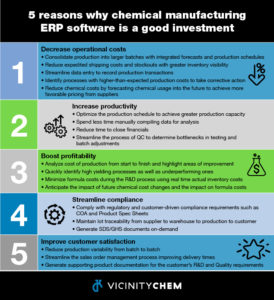When it comes to ERP software for manufacturing, what should you know?
Chemical manufacturers have specific needs and relying on a software made with formula-based manufacturing companies in mind maximizes efficiencies, ultimately saving time and money.
VicinityChem is a comprehensive ERP software system designed for chemical manufacturers. Our chemical manufacturing software grows as you grow, allowing you to unify your business departments, improve operations and drive sustainable growth.
When it comes to ERP software for manufacturing, what should you know?
Tracking production at the recipe level instead of measuring your production with a traditional bill of material is a key feature for chemical ERP software systems designed for manufacturers. When your company uses a recipe, the software will provide the guidelines for the master recipe while allowing you to easily document what you used — which may be different than the standard recipe or which may have used a substituted input. This detailed tracking gives you more flexibility than traditional manufacturing software systems.
To achieve the same results with a system that uses a bill of material as the foundation, you would need to set up a new job for every possible combination of goods that make a product. And you would need to set up a new job for every bulk production run.
This requires additional data entry, which wastes time and often leads to errors. It also requires more manual accounting. For example, if you are scaling up a batch for a bulk production run while recording the results across individual logs, you would need to divide your results manually, you lose the ability to accurately trace lots, and there is no longer an accurate way to capture true overall yields.
Four features to consider about software built for batches:
1.Variation in yield
Most systems only support linear input to output process. It’s important to ensure your ERP system can incorporate variations in process from one batch to the next, even when the same end product is being produced.
Formula manufacturers live and die by yields. If your product mix yields vary significantly from standard, there are several areas that will be affected. If a formula requires more material than expected to get the same finished goods, you may experience raw material shortages, delayed shipments of finished goods, an increase in expedited orders through production, or increases in QC additions to bring a product within specification.
Each of these situations affects your company’s overall profits. Additionally, if the actual formula yield is not in line with theoretical yields, it is probable that you are not experiencing the margins you were expecting. If you experience higher than average losses for a formula, you are losing an opportunity for added profits.

2. Variation in ingredients
Most systems require that you use the exact same ingredients and quantities of ingredients every time you want to produce a specific finished good. If you want to use different ingredients or quantities, you must create new logs to support each variation.
Accounting for and tracking different ingredients and quantities of ingredients for a product without requiring businesses to create new logs is a time saver and a reporting must-have in an ERP system specifically for chemical manufacturers.
As formulas change, you may want to see the previous versions to determine what was changed, what was the result of these changes, and sometimes revert to a previous version. A formula management system should deliver functionality to manage old formulas, newly commercialized formulas as well as experimental formulas for process manufacturers, specifically chemical companies.
Also, changes to chemical ingredients happen from time to time. This change can be very time-consuming if there are a number of formulas or levels of formula intermediates. A tool that can process this change can save a great deal of time and reduce the likelihood of error. With VicinityChem you can select a chemical to replace and substitute this item for one, many or all formulas.

For more information, click here.
3. Variation in packaging
As a formula manufacturer in the chemical industry, you blend and compound a bulk product, then package it into multiple package sizes. Most systems require a specific batch or job each time a business wants to do a bulk production run that requires different packaging.
Having the ability to easily track bulk production runs and incorporate variations in packaging needs based on the size of the batch makes life much easier for your team.
The same formula may be packaged in 1, 5 or 55-gallon containers. Grouping this production by formula can reduce the number of batches in a period and provide other economies of scale.

- Include sales order demand as well as the forecasted demand to increase batch sizes where appropriate
- When using intermediates, aggregate the finished good demand to maximize the batch size resulting in fewer batches during a period
- Where possible, create one batch ticket that produced multiple end items. This will result in fewer batches in production and improved quality
- Leverage variable unit of measure conversions for finished goods to view output by volume or weight. This will help scale a batch to cover all items with ease
4. Scheduling by formula
A good ERP system for chemical manufacturers should seamlessly manage production runs that are interdependent and report outputs at each stage to calculate variable inputs, logging of intermediate batches and by-products or co-products created along the way.
Formula manufacturers frequently schedule their production runs in response to orders placed. This allows them to control overages or excess stock. However, the increase in machine set-up time and clean-up time rises substantially when small batches are produced individually. Batch yields can vary greatly depending on a number of variables. Grouping production batches by formula or setup will minimize machine downtime, decreases the cost of production, and reduces potential loss.
Vicinity’s scheduling module allows complete control over their production schedule, allowing you to group batches together when a formula or equipment is shared. The production costs are divided afterward and associated separately with individual orders. This decreases the cost per unit and increases overall profitability.
For more information, read on.
Complete chemical manufacturer ERP system, such as VicinityChem, can seamlessly integrate many of the unique aspects of your chemical manufacturing process, saving you time and money while simultaneously requiring less set-up and providing you with more accurate data.
Here are 5 reasons why chemical manufacturing ERP software is a good investment:
Our intuitive and efficient software solves the challenges of recipe-based manufacturing companies. VicinityChem is designed to alleviate time-consuming and error-prone workarounds that are required to use traditional manufacturing software systems. Our product empowers your team with an accurate, centralized data set and a host of features that can save time and money while reducing errors.
Vicinity software solves your chemical manufacturing needs and improves operations across every department.
To schedule a demo and learn more, click here.


